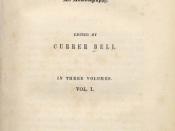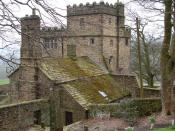Many of the stereotypes now popularly associated with the word Victorian, especially in reference for gender issues in that era, the representation of women of the upper class in the whole decadent and dissolute, while the idealized middle-class women, by contrast, were selfless and morally upright sometimes almost ethereal being whose capable of keeping not only her children but also her husband in line morally. Bronte rejects through Jane much of the domestic feminine ideal and the traditional ideas about the proper duties of women. This separation between men and women, each with its own set of responsibilities, assert that teaching, either in a school or as a governess, was the only profession open to the average middle-class women; a very few might earn their living by their pen (as Bronte eventually did). Women of the upper classes were generally expected to achieve social position and economic security through marriage, but marrying for such reasons was repugnant to Bronte.
Some critics who had responded to Bronte's work Jane Eyre emphasized its attribution to disturb and to please readers because of its troubling attitude about gender, class and race. One of Bronte's biographer (Gilbert) remark the unconventionality of Bronte's work Jane Eyre that struck Victorian readers as totally improper from an old master to his young govern" the ease of his manner freed me from painful restrained, the friendly frankness...."
The entire novel represents the rage felt by women in a masculine dominated culture .The novel also focus on Jane's experience in terms of the prejudicial class-based society and the social positions of Victorian women .The social role of "angel in the house" condition is exemplified by Miss Temple and Helen Burns. Jane was fond of Miss Temple who represents a ladylike virtues, she dispensed food for the hungry and visited...


